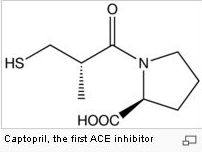Should we use ACEi or ARBs for prevention of renal failure in patients with hypertension or diabetes?
 Diabetes mellitus (DM) and hypertension (HTN) increase the risk for development of chronic kidney disease (CKD). Type 2 diabetes (DM 2) is the biggest single cause of ESRD in the United States which is reflected in the mnemonic for differential diagnosis of CKD.
Diabetes mellitus (DM) and hypertension (HTN) increase the risk for development of chronic kidney disease (CKD). Type 2 diabetes (DM 2) is the biggest single cause of ESRD in the United States which is reflected in the mnemonic for differential diagnosis of CKD.Should we use ACE inhibitors (ACEi) or Angiotensin II Receptor Blockers (ARBs) for prevention of CKD in patients with HTN and/or DM?
According to UpToDate (subscription required):
ARBs have similar antiproteinuric activity as ACEi but it should not be assumed that ARBs are equivalent to ACEi. A medication from either group should be used in proteinuric nondiabetic kidney disease, although the strength of evidence favors the use of an ACEi.
Summary: ACEi is the medication of choice to prevent progression of CKD in HTN.
How about patients with DM?
Again, according to another UpToDate review:
The authors prefer initiating therapy with ACEi inhibitor in DM 1 nephropathy and either ACEi or ARBs in DM2 nephropathy.
Summary: Either ACEi or ARB can be used to prevent progression of CKD in DM 2. I would still prefer ACEi since they have been on the market longer and are generally less expensive due to the fact that generics are available.
References:
Prevention of the Development and Progression of Renal Disease. J Am Soc Nephrol 14:S144-S147, 2003 (free full text).
Antihypertensive therapy and progression of chronic kidney disease. UpToDate (subscription required).
Treatment and prevention of diabetic nephropathy. UpToDate (subscription required).
ACEi and ARBs links and images are from Wikipedia.